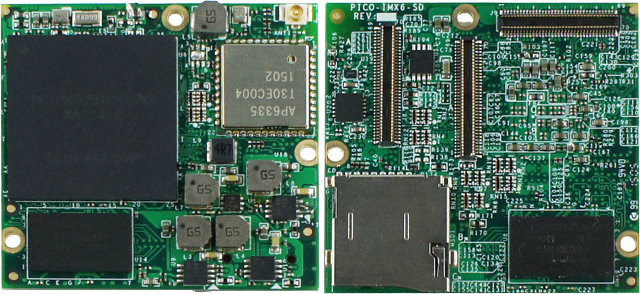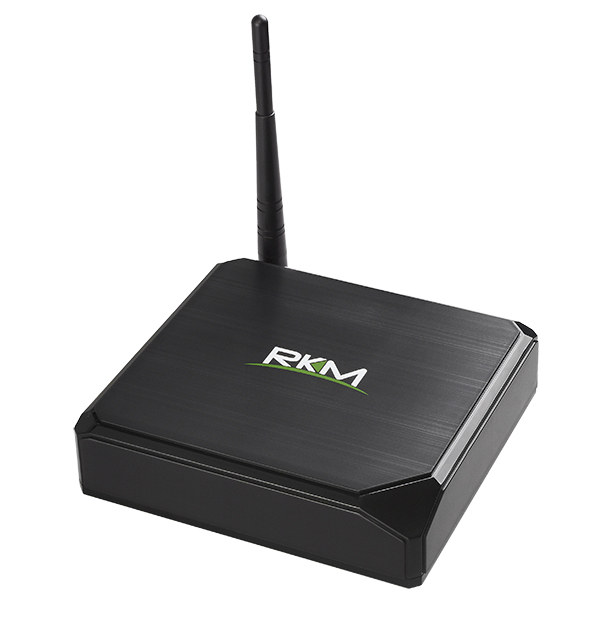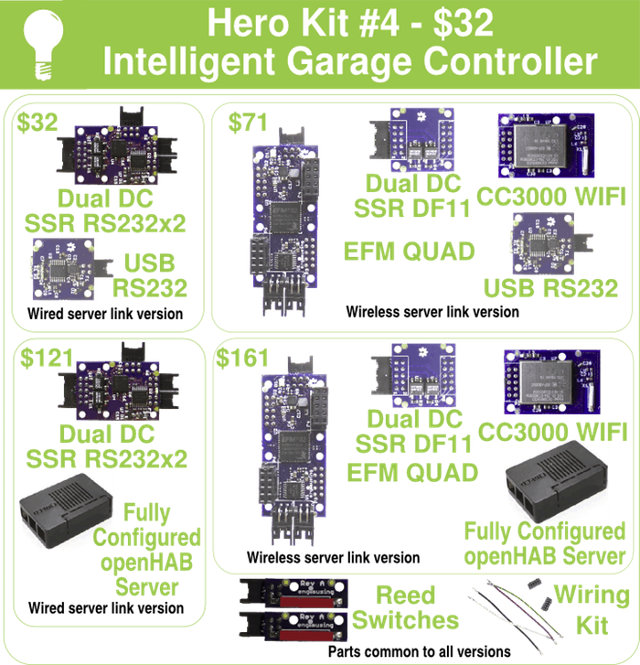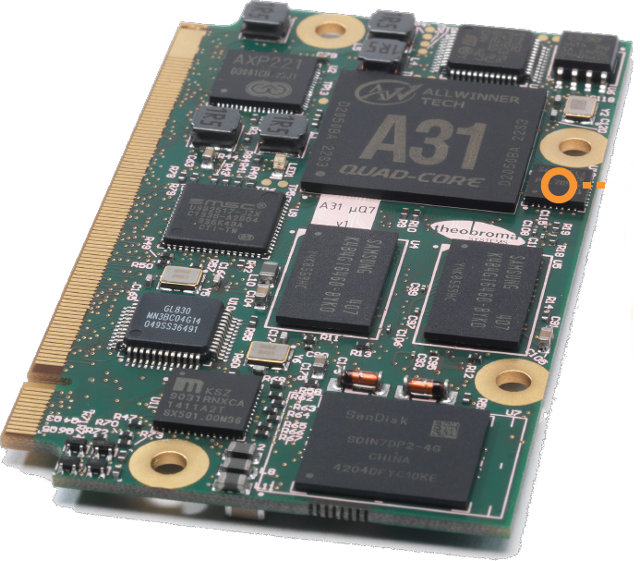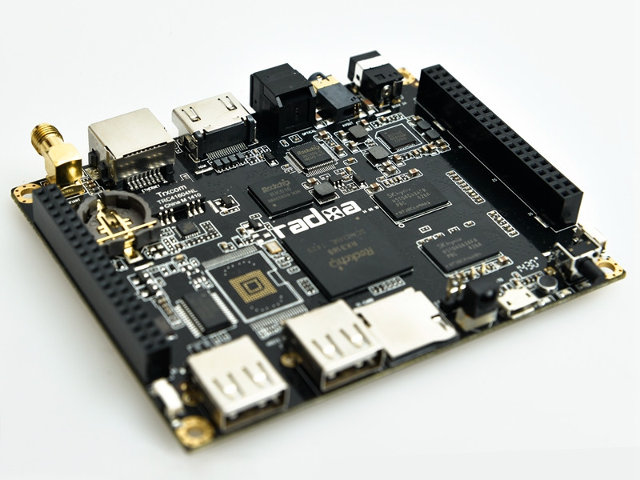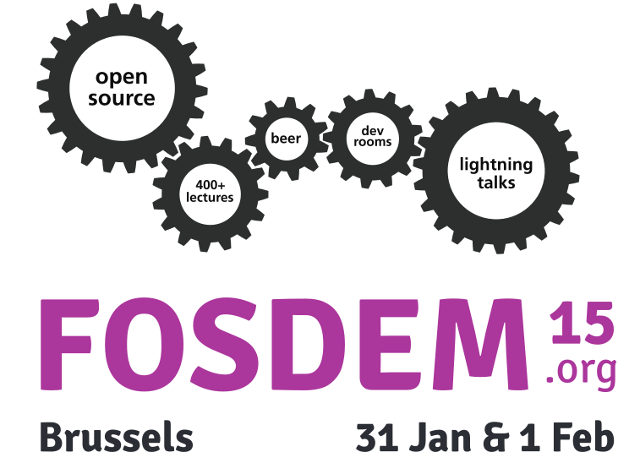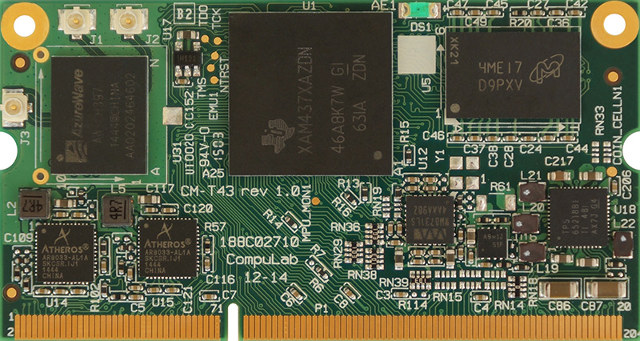Intel Edison is a board made for wearables featuring an SoC with Intel Atom and Quark CPU cores. TechNexion, an embedded systems company based in Taiwan, has decided to make a mechanically and electrically compatible system-on-module featuring Frescale i.MX6 Solo or Duallite ARM Cortex A9 processor called PICO-iMX6. The company is also providing a PICO-DWARF baseboard that’s both compatible with PICO-iMX6 SoM and Edison board. DWARF stands for “Drones, Wearables, Appliances, Robotics and Fun”, so that pretty much explains what the platform is for. PICO-iMX6 System-on-Module Two version of the modules are available: PICO-iMX6-SD and PICO-iMX6-EMMC, the former with a micro SD slot for storage, and the latter a 4GB eMMC. Both share the followings specifications: SoC – Freescale i.MX6 Solo / Duallite single/dual core ARM Cortex A9 @ 1Ghz with Vivante GC880 3D GPU and Vivante GC320 2D GPU (Composition) System Memory – 512MB or 1GB DDR3 Storage – […]
Rikomagic MK80LE (Linux Edition) Octa-core Ubuntu mini PC
Allwinner A80 based Rikomagic MK80 Android TV box, now has a Linux sibling with Rikomagic MK80LE (Linux Edition) running Ubuntu 14.04, and allegedly supports 2D/3D graphics acceleration, and hardware video decoding. Two versions are available MK80LE with 2GB RAM & 16GB Flash, and MK80LE Plus with 4GB RAM & 32GB flash. The hardware specs are the same as the Android versions (and Tronsmart Draco AW80 Meta / Telos): SoC – AllWinner Ultra Core A80 4x Cortex 15 @ 2016 MHz, 4x Cortex A7 @ 1320 MHz big.LITTLE processor with Imagination Technologies PowerVR GC6230 GPU with support for OpenGL ES 1.1/2.0/3.0, Directx 9.3 System Memory – 2GB (MK80LE), or 4GB (MK80LE Plus) RAM Storage – 16 GB (MK80LE) or 32GB (MK80LE Plus) eMMC, external SATA port (via a USB 2.0 bridge), and micro SD slot up to 64GB Video Output – HDMI 1.4 + AV port Audio Output – HDMI, AV […]
Engimusing DIY Home Automation Modules Are Managed with openHAB installed on ODROID-C1 Board (Crowdfunding)
Engimusing has launched a crowdfunding campaign on Kickstarter for their home automation solutions comprised of tiny modules (20x20mm) based on Silicon Labs Gecko EFM32 MCUs, some sensor modules and a server based on ODROID-C1 board and enclosure pre-installed and configured with openHAB open source home automation software. There are not that many technical details about the EFM32 modules, but they come into two variants: standalone & DF11-10 I/O, the latter allowing you to vertically stack multiple modules. This video shows how DF11-10 IO connectors work. The modules are said to be programmable with the Arduino IDE. The openHAB server is a standard ODROID-C1 board (Amlogic S805, 1GB RAM) with 4GB flash (eMMC or micro SD), and a black enclosure. If you value your money more than your time, and/or already have another computer or board (Raspberry Pi, BeagleBone Black…) that runs Linux, you could also install and configure openHAB by […]
Theobroma Systems Introduces A31-μQ7 Micro QSeven System-on-Module Powered by Allwinner A31 Processor
Most standardized system-on-modules for embedded and industrial applications are still based on established Silicon vendors such as Freescale, Texas Instruments or Atmel, simply because documentation and support is generally much better than relatively new SoC vendors, most of the time China-based, such as Allwinner or Rockchip. That does not mean nobody is using Rockchip or Allwinner on their modules, as shown recently with Olimex RK3188-SOM, and previously with an Allwinner 10 CoM. But Theobroma Systems, an Austrian based engineering services and embedded systems solutions company, may have a first with a Micro Qseven compliant modules powered by Allwinner A31, simply called A31-μQ7. A31-μQ7 module specifications: SoC – Allwinner A31 quad core ARM Cortex A7 processor up to 1.2GHz with 256KB L1 cache / 1024KB L2 cache, and PowerVR SGX544MP2 GPU System Memory – Up to 2GB DDR3 Storage – Up to 64GB eMMC, Up to 16MB SPI NOR flash, On-board […]
Radxa Rock Lite Board Price Drops to $39
When the new Radxa Rock Lite was announced for $59 in September 2014, it was one of the most inexpensive quad core ARM Linux development board available on the market. But ODROID-C1 board in December 2014, and especially Raspberry Pi 2 board in February 2015 changed all that, as these two quad core boards sell for $35 before shipping and taxes. So the company has now decided to drop the price to $39 for the Radxa Rock Lite board. Let’s remind us of Radxa Rock Lite specifications: SoC – Rockchip RK3188 ARM Cortex-A9 quad core @ 1.6Ghz + Mali-400 MP4 GPU System Memory – 1GB DDR3 @ 800Mhz Storage – micro-SD SDXC up to 128GB Video Output – HDMI 1.4 up to 1080p@60hz, and AV output. LVDS interface. Connectivity – 10/100M Ethernet port, WiFi 150Mbps 802.11b/g/n with antenna Audio I/O – Audio S/PDIF, headphone jack Camera – CSI interface USB […]
Qualcomm Dragonboard 410c is Another 96Boards Compliant 64-bit ARM Development Board
Linaro announced the 96Boards initiative at Linaro Connect Hong Kong last month, and in collarabation with Huawei announced Hikey development board following this new standard. Qualcomm has now joined the Fray with Dragonboard 410c, a 96Boards board powered by Qualcomm Snapdragon 410 quad core Cortex A53 processor. Dragonboard 410c specifications: SoC- Qualcomm Snapdragon 410 (APQ8016) quad-core ARM CortexA53 @ 1.2 GHz with Adreno 306 GPU @ 400MHz System Memory – LPDDR2/3 533MHz, Single-channel 32-bit (4.2GBps) Storage – eMMC 4.51 + micro SD 3.0 (UHS-I) Video Output – HDMI up to 1080p Connectivity – Integrated 802.11 b/g/n, BT/FM, GPS USB – 2x USB 2.0 host ports, 1x micro USB OTG port. Camera – Support for 13 MP camera with Wavelet Noise Reduction, JPEG decoder, and other post-processing techniques done in hardware Expansion: 1x 40 pin low speed expansion connector – UART, SPI, I2S, I2C x2, GPIO x12, DC power 1x 60 […]
(Most of) FOSDEM 2015 Videos Are Now Online
FOSDEM 2015 took place on between the 31st of January and 1st of February, and while some sessions were not recorded on videos, most of them were, and the organizers are now slowly processing and uploading 402 videos to their server. So far 210 videos have been uploaded, including the Embedded Devroom. You can follow the upload status to check out when your preferred track/devroom sessions are uploaded. For example, “internet of things” videos have not been uploaded so far, so you’d need to be a bit more patient for this topic. One of such videos is “Upstream Allwinner ARM SoC (A10 / sunxi) support status” by Hans de Goede, which includes the slides on the left and video of the right. This makes the presentation easy to follow (despite the slides being cropped), but probably explains why it takes so long to process the videos. http://video.fosdem.org/2015/devroom-embedded/allwinner_upstream__CROPPED_PRES.mp4 You can also […]
Compulab Announces CM-T43 CoM and SBC-T43 Board Powered by TI Sitara AM437x Processors
Compulab has just introduced CM-T43 computer-on-module (CoM) powered by Texas Instruments Sitara AM437x ARM Cortex A9 processor and built-in wired and wireless connectivity, and targeting networking, industrial communications and IoT applications. The company has also announced the corresponding SBC-T43 single board computer featuring the module plus a baseboard. Compulab CM-T43 Module CM-T43 CoM specifications: SoC – Texas Instruments Cortex-A9 Sitara AM4376 / AM4379 SoC up to 1GHz with PowerVR SGX530 GPU (AM4379 only) System Memory – Up to 1GB DDR3 Storage – 4GB to 32GB on-board eMMC, 128MB to 512MB on-board SLC NAND Connectivity – 2x Gigabit Ethernet PHY, and Marvell 88W8897 chipset for dual-band, dual-antenna 2×2 MIMO 802.11ac/a/b/g/n WiFi, Bluetooth 4.0 Low Energy, and NFC (ISO 14443A/B, ISO 18092 and ISO 15693) Audio codec – Wolson Audio codec with stereo line-out, line-in, mic via edge connector 204-pin SO-DIMM edge connector with access to: USB2.0 high-speed dual-role (host / device) port, […]


